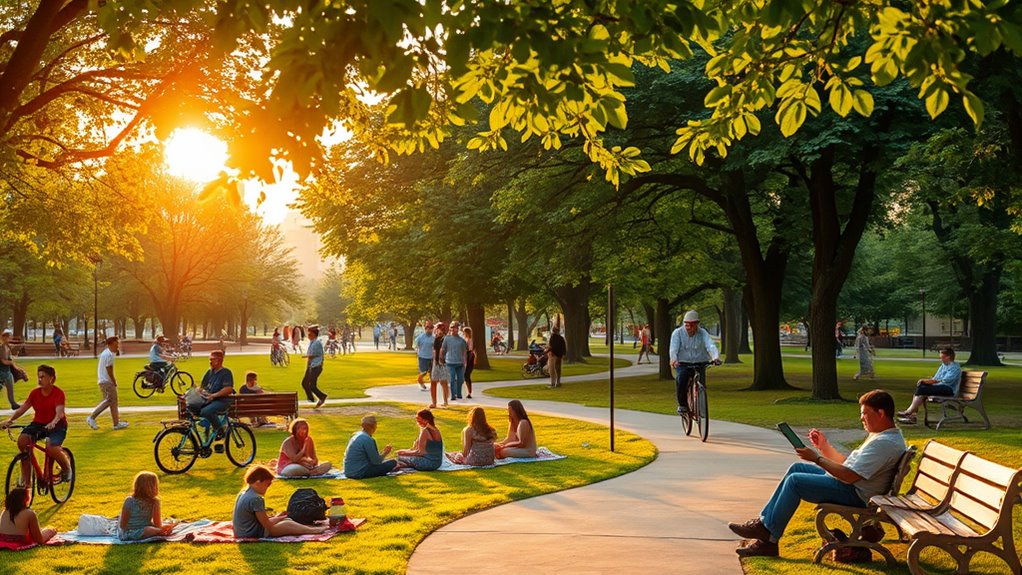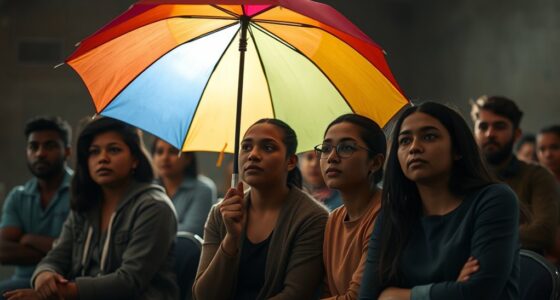Your weekend leisure reveals how society shapes work and identity. By setting aside specific days for rest and activities, you reinforce boundaries between professional roles and personal life. These routines reflect cultural values, social status, and historical changes, influencing your sense of belonging and societal participation. Technology, economic factors, and social class further transform how you experience leisure. If you explore further, you’ll discover how these patterns influence work relationships and societal structures in-depth.
Key Takeaways
- Leisure during weekends offers a cultural space for identity expression, social bonding, and resistance, shaping perceptions of work and rest.
- Weekend activities reinforce or challenge social stratification by reflecting class-based access and cultural capital.
- Rituals and leisure routines serve as a counterbalance to work identity, fostering personal well-being and social cohesion.
- Technological advancements modify leisure practices, impacting work-life boundaries and influencing attitudes toward rest and productivity.
- Weekend leisure boosts economic activity, influencing societal values around work, leisure, and the importance of balance.
The Historical Development of the Weekend
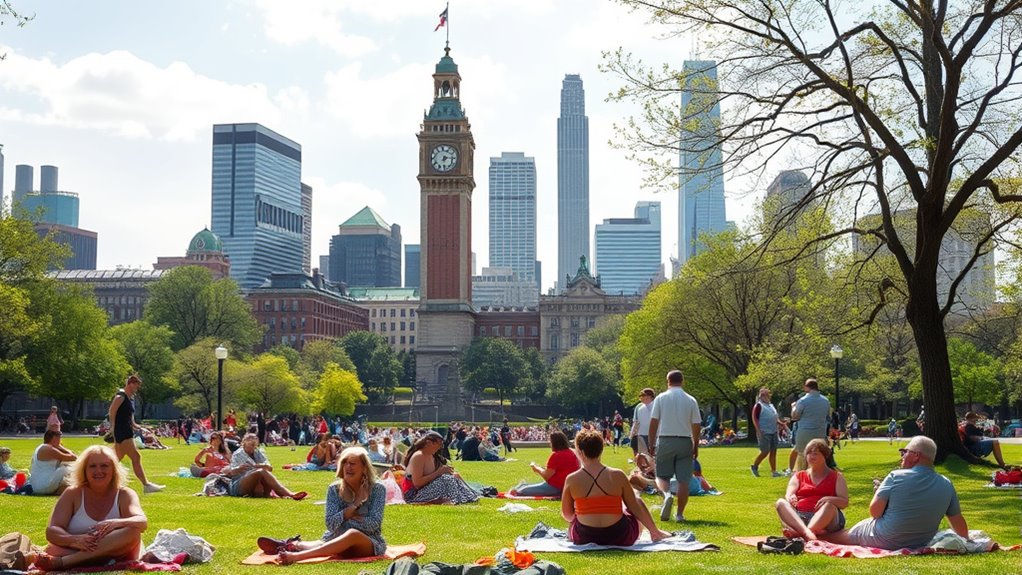
The concept of the weekend as a designated time of rest and leisure has evolved over centuries, reflecting broader social and economic changes. Historically, religious influences played a significant role in shaping early notions of a day of rest, with many societies observing weekly holy days. As labor reforms gained momentum during the Industrial Revolution, workers pushed for shorter work hours and specific days off, which gradually led to the formalization of a two-day weekend. These reforms aimed to improve workers’ well-being and promote social stability. Over time, the weekend shifted from being solely religious to also serving as a period for leisure and personal activities. This transformation highlights how religious traditions and labor movements combined to create the modern concept of the weekend. Additionally, the adoption of vetted appliances for home use has increasingly supported leisure activities during this time, emphasizing comfort and convenience.
Cultural Variations in Weekend Practices
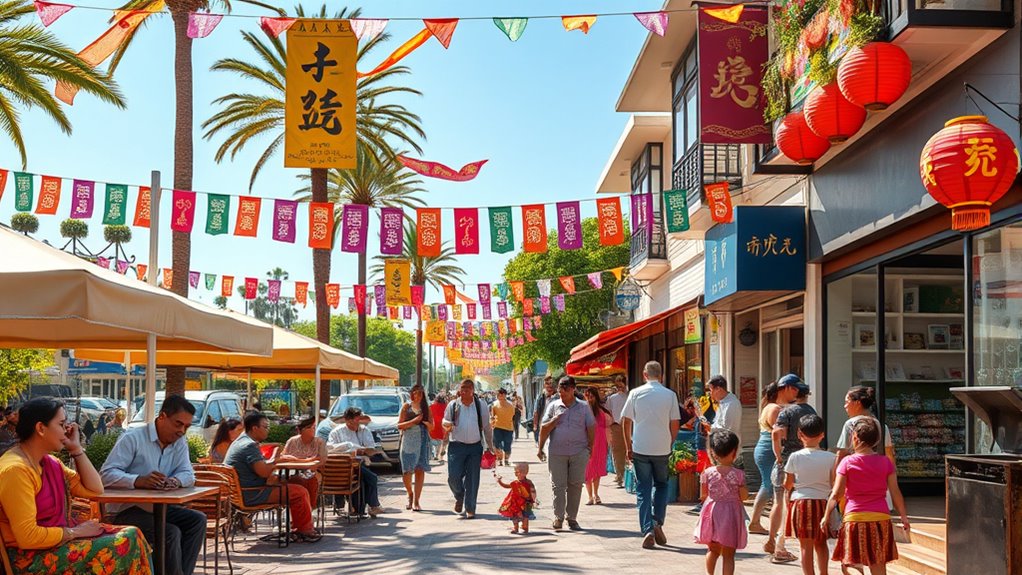
You’ll notice that weekend customs vary widely across cultures, shaping how people relax and connect. In some societies, rest and family time hold deep cultural significance, while others emphasize work-free days differently. Understanding these differences can reveal much about each culture’s values and social priorities. Additionally, the way leisure activities are integrated into weekends can influence overall social cohesion and community well-being.
Weekend Customs Worldwide
Around the world, weekend customs vary widely, reflecting diverse cultural values and societal structures. In some regions, religious observances dominate weekends, shaping daily routines and community gatherings. Others emphasize regional festivities, turning weekends into lively celebrations. For example:
| Country | Weekend Practice | Key Activities |
|---|---|---|
| India | Sunday as religious day | Temple visits, prayer, family gatherings |
| Spain | Sunday siesta and festivals | Rest, regional festivals, outdoor markets |
| Saudi Arabia | Friday prayers and family time | Religious services, communal meals |
| Italy | Sunday family meals | Extended meals, community events |
| Australia | Outdoor recreation and sports | Beach trips, barbecues, sports events |
Your experience of weekends is shaped by these customs, blending religious observances and regional festivities that foster community and cultural identity. Additionally, understanding how different cultures incorporate leisure activities into weekends can offer deeper insights into societal priorities.
Cultural Significance of Rest
Cultural values deeply influence how societies perceive and prioritize rest during weekends. In some cultures, rest is seen as resistance, a way to challenge relentless work demands and societal expectations. For others, leisure has become heavily commodified, turning free time into a market-driven experience focused on consumption rather than genuine relaxation. These variations reflect deeper beliefs about work, identity, and community. In cultures valuing rest as resistance, weekends serve as a vital act of defiance against a culture of overwork. Conversely, in societies where leisure is commodified, the weekend often becomes a marketplace for entertainment and consumerism, diluting its restorative potential. Recognizing these differences helps you understand how cultural narratives shape weekend practices and the profound significance placed on rest worldwide. Additionally, understanding ethical hacking principles reveals how safeguarding leisure spaces from cyber threats can also influence cultural perceptions of digital relaxation.
Leisure Activities and Their Social Significance
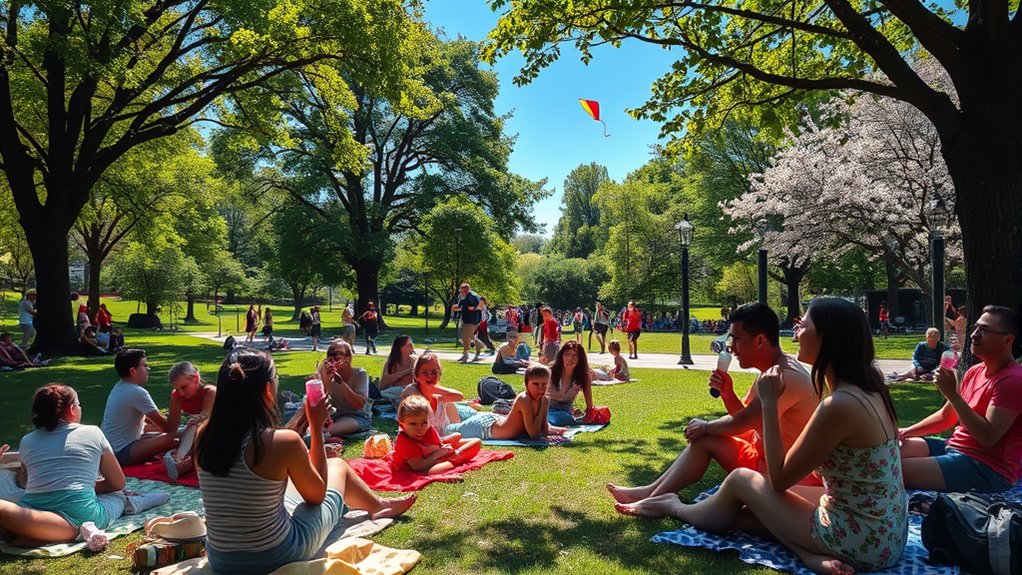
Your leisure activities on the weekend play a key role in building social bonds and strengthening connections. They also serve as a way to express cultural identity and values. At the same time, they reveal how social stratification influences access and participation in different leisure pursuits. Engaging in certain leisure activities can also reflect one’s vibrational state and mindset, which are crucial elements in the Law of Attraction mindset shifts, shaping how individuals attract and experience their social environments.
Social Bonds Formation
Leisure activities play a essential role in shaping social bonds, as they provide opportunities for people to connect, share experiences, and build trust outside formal settings. When you participate in group sports, hobby clubs, or social gatherings, you strengthen community bonding by fostering a sense of belonging. These activities help you expand and reinforce friendship networks, making relationships more resilient and meaningful. Engaging in leisure with others allows you to develop shared memories and mutual understanding, which deepen trust and loyalty. As you invest time in these interactions, you contribute to a more cohesive social fabric. Moreover, participating in such activities can also promote Just Candles creating a relaxed environment conducive to open communication. Ultimately, leisure activities act as a catalyst for creating lasting social connections that support both individual well-being and community resilience.
Cultural Identity Expression
Engaging in leisure activities provides a powerful way for you to express and reinforce your cultural identities. Through fashion statements, you showcase your unique heritage and personal style, making your identity visible to others. For example, wearing traditional clothing or accessories during leisure time can communicate your cultural background. Religious symbolism also plays a significant role; donning symbols like crosses, turbans, or other sacred items allows you to connect with and share your beliefs openly. These expressions serve as acts of cultural pride and community bonding. Leisure activities become a canvas where you can celebrate your background, affirm your values, and foster a sense of belonging. By doing so, you actively participate in shaping and maintaining your cultural identity through everyday leisure choices. Incorporating anime movies into leisure routines can also serve as a means of cultural exchange and identity expression.
Social Stratification Impact
Participating in leisure activities often reflects and reinforces social hierarchies, revealing how cultural expressions are shaped by class and status. For example, those with higher incomes tend to engage in exclusive sports, travel, or arts, emphasizing class distinctions. Conversely, lower-income individuals may participate in community-based or affordable activities, which can limit social mobility. Leisure activities therefore serve as markers of social stratification, reinforcing existing power dynamics. They not only reflect your social position but also perpetuate it, shaping perceptions of worth and status. Recognizing these patterns helps you understand how leisure contributes to maintaining or challenging societal divisions rooted in wealth inequality, with equity considerations playing a crucial role in promoting inclusivity and social mobility.
Work Identity and Weekend Rituals
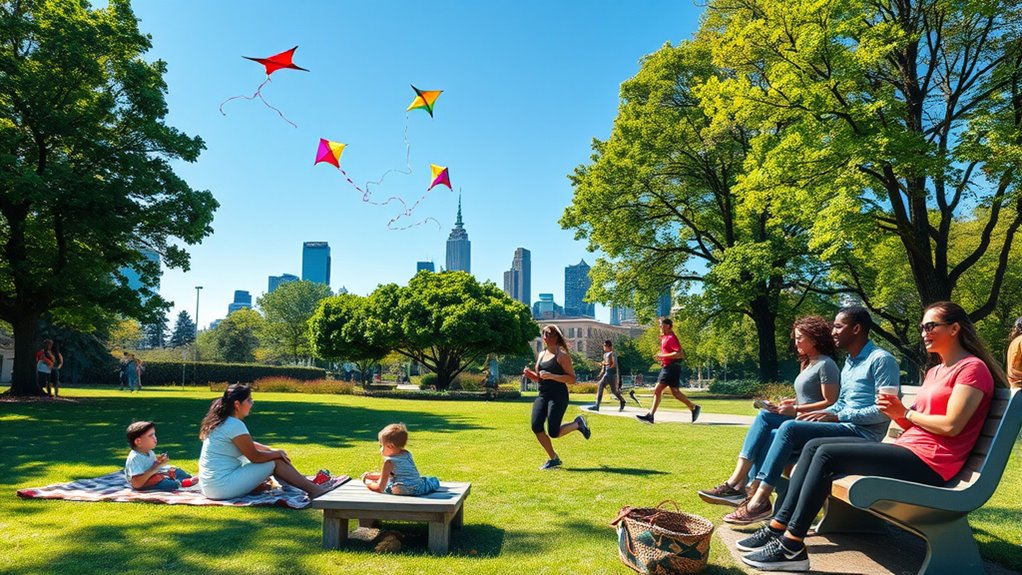
Weekend rituals often serve as an essential counterbalance to weekday work identities, allowing you to reaffirm your personal values and social roles outside the office. These rituals help you detach from professional responsibilities and reconnect with what matters most to you. By engaging in specific activities—like family dinners, hobbies, or community events—you reinforce your work identity while also exploring other facets of yourself. Weekend rituals create a space where your sense of self is shaped beyond your job title, helping you maintain a balanced self-image. They also offer a chance to reflect on your achievements and reset your mindset for the upcoming week. Incorporating intentional leisure activities into your weekend can further support your mental well-being and personal growth. Ultimately, these rituals help you navigate the complex relationship between your work identity and personal life, fostering a more integrated sense of self.
The Impact of Technology on Weekend Leisure
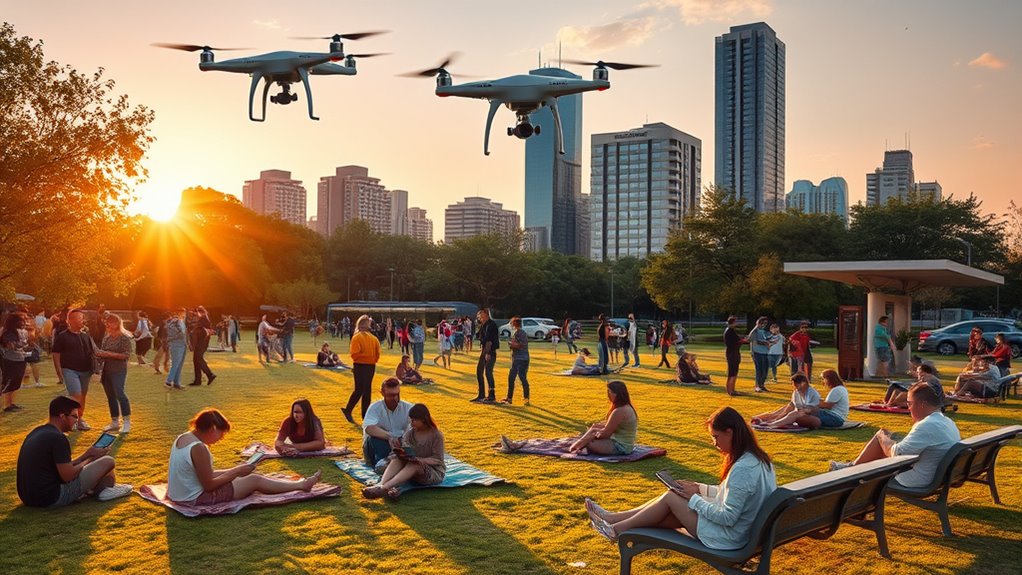
Technology has profoundly transformed how you spend your leisure time, blurring the lines between relaxation and productivity. You now often engage in virtual socialization, connecting instantly with friends and family worldwide. However, this constant digital presence can lead to burnout, making a digital detox essential for genuine relaxation. Many seek moments away from screens to reconnect with themselves and nature. The table below illustrates different ways technology influences your weekend leisure:
| Digital Engagement | Offline Activities |
|---|---|
| Virtual socialization | Outdoor adventures |
| Streaming services | Reading or hobbies |
| Social media use | Digital detox periods |
| Online shopping | Mindfulness and relaxation |
Balancing digital use with offline activities helps you enjoy meaningful, restorative leisure. Incorporating anti-aging ingredients like collagen and hyaluronic acid into self-care routines, such as eye patches, can also contribute to overall well-being and appearance.
Economic Implications of Weekend Leisure

The way people choose to spend their leisure time directly influences economic activity, shaping industries and employment patterns. Weekend leisure boosts consumer spending across sectors like hospitality, retail, and entertainment, fueling economic growth. Increased consumer spending during weekends enhances economic productivity by stimulating demand and supporting jobs in these industries. When you spend money on dining out, entertainment, or travel, you contribute to a cycle of economic activity that benefits local businesses and communities. This pattern also encourages investment in leisure infrastructure, creating more employment opportunities. Overall, weekend leisure acts as a crucial driver of economic vitality, as your leisure choices translate into tangible economic benefits, reinforcing the interconnectedness of leisure behaviors and broader economic health.
Shifts in Work-Life Balance and Societal Attitudes
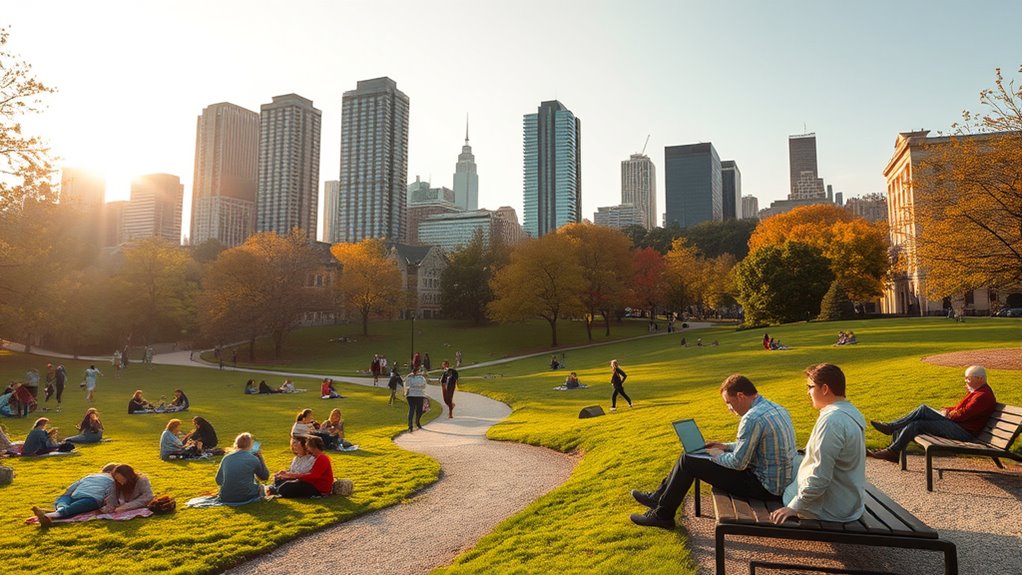
As societal attitudes toward work and leisure continue to evolve, there’s been a noticeable shift in how people balance their professional and personal lives. You now prioritize work life balance more than ever, recognizing its importance for well-being and productivity. Society increasingly values leisure time, challenging traditional views that equated long hours with success. These changing societal attitudes encourage flexible work arrangements and promote the idea that leisure isn’t a luxury but a necessity. As a result, you may find yourself more willing to set boundaries between work and personal time, seeking a healthier balance. Overall, these shifts reflect a broader cultural transformation that recognizes leisure as integral to a fulfilling, well-rounded life.
The Role of Social Class and Access in Leisure Time
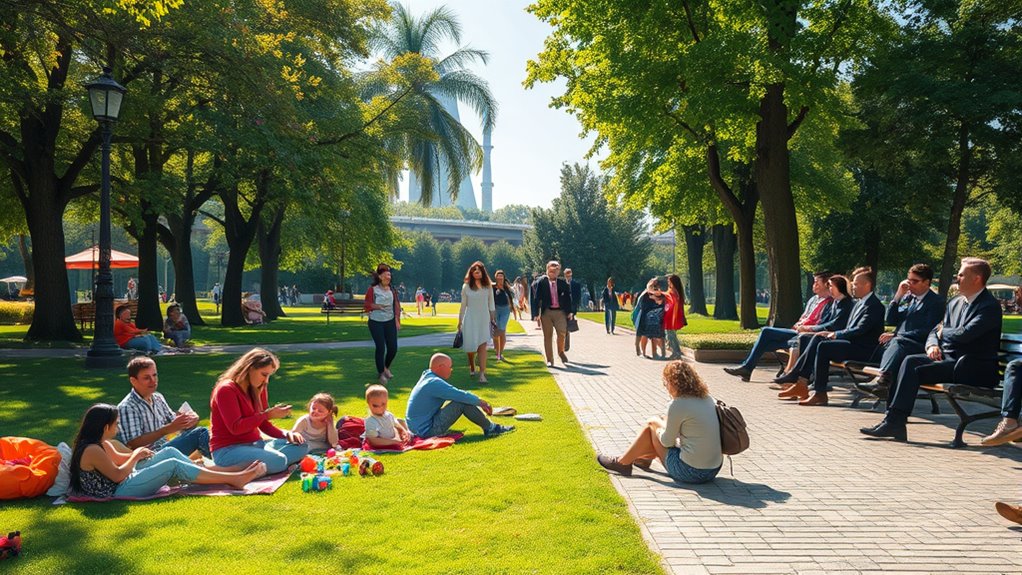
Social class considerably influences how much leisure time you can access and enjoy. Social inequality creates disparities in the opportunities available for leisure activities, making it harder for lower classes to participate fully. Class distinctions often determine your ability to afford memberships, travel, or attend events, limiting leisure options. Wealthier individuals may have flexible schedules and resources that allow for extended leisure periods, while those in lower classes face time constraints and financial barriers. These differences reinforce social divides, shaping how leisure is experienced across society. Access to leisure isn’t just about free time; it’s about the quality and diversity of experiences you can pursue. Recognizing these inequalities helps us understand how social stratification influences not only work but also the leisure that defines personal fulfillment.
Future Trends in Weekend and Leisure Culture

Emerging technological advancements and shifting cultural values are shaping the future of weekend and leisure activities. You’ll likely see more emphasis on digital detox retreats, where disconnecting from screens helps restore mental clarity and foster genuine social interactions. Eco-tourism will grow in popularity, as more people seek sustainable travel options that prioritize environmental preservation and local communities. These trends reflect a desire to escape the digital overload of daily life and reconnect with nature, health, and authentic experiences. As awareness of environmental issues increases, leisure activities will become more eco-conscious, encouraging responsible tourism and mindful relaxation. Future weekends may blend technology-free zones with eco-friendly adventures, redefining leisure as a balance between modern convenience and sustainable living.
Frequently Asked Questions
How Do Weekend Habits Differ Across Various Age Groups?
You’ll notice that weekend habits vary across age groups due to age-specific hobbies and generational leisure preferences. Younger people often prioritize social activities and outdoor adventures, while middle-aged adults may focus on family time or fitness. Older adults tend to prefer relaxing activities like reading or gardening. These differences reflect how leisure evolves with age, shaping how each generation spends their weekends and influences their work-life balance.
What Role Does Gender Play in Leisure Activity Choices?
Imagine breaking free from gender norms, choosing leisure activities based on your genuine preferences. Gender influences activity choices as societal expectations shape what’s considered appropriate for men and women. You might find yourself engaging in sports, gaming, or socializing, but these choices are often guided by ingrained norms rather than personal desire. Recognizing this helps you understand how activity preferences are molded, encouraging more authentic leisure experiences beyond stereotypes.
How Do Religious Beliefs Influence Weekend Practices Worldwide?
Religious beliefs greatly influence your weekend practices through religious rituals and sacred observances. You might attend services, observe fasting, or participate in community celebrations depending on your faith. These practices guide how you spend your time, shaping your leisure activities and social interactions. Around the world, different religions assign specific days for sacred observances, affecting how individuals balance religious commitments with leisure and family time during the weekend.
What Are the Psychological Effects of Weekend Leisure on Workers?
You’ll find that weekend leisure considerably benefits your mental health by reducing stress and boosting your mood. When you take time to relax and enjoy hobbies or social activities, you experience a sense of renewal that helps you face the upcoming workweek with more resilience. These psychological effects improve your overall well-being, making work feel less overwhelming and increasing your motivation and productivity during the week.
How Do Urban and Rural Environments Shape Leisure Opportunities?
You might find that urban parks offer accessible, vibrant spaces for relaxation, fostering community bonds and diverse activities. Conversely, rural festivals provide a charming, immersive experience rooted in tradition, encouraging social connection and cultural appreciation. Urban environments often emphasize convenience and variety, while rural areas cultivate intimacy and authenticity. Both settings shape leisure opportunities uniquely, influencing how you unwind and connect, enriching your overall sense of well-being.
Conclusion
You’ve seen how weekends shape our lives, from cultural traditions to technological changes. Did you know that, on average, Americans spend over 4 hours daily on leisure activities? This highlights leisure’s significance in balancing work and personal fulfillment. As society evolves, understanding these patterns helps you appreciate how leisure influences your identity and well-being. Embrace your weekends—they’re more than just days off—they’re essential for a richer, healthier life.
